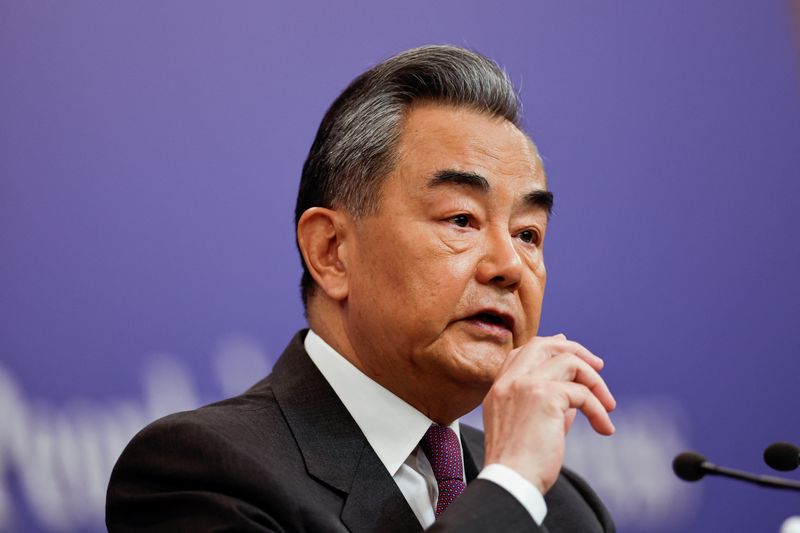Australian business leaders to meet Chinese foreign minister

FILE PHOTO: Chinese Foreign Minister Wang Yi attends a press conference on the sidelines of the National People’s Congress (NPC), in Beijing, China March 7, 2024. REUTERS/Tingshu Wang/File Photo
RIO
+0.14%
Add to/Remove from Watchlist
Add to Watchlist
Add Position
Position added successfully to:
Please name your holdings portfolio
Type:
BUY
SELL
Date:
Amount:
Price
Point Value:
Leverage:
1:1
1:10
1:25
1:50
1:100
1:200
1:400
1:500
1:1000
Commission:
Create New Watchlist
Create
Create a new holdings portfolio
Add
Create
+ Add another position
Close
By Kirsty Needham
SYDNEY (Reuters) – Australian business leaders are set to meet China’s foreign minister in Canberra, saying their country lacks knowledge of its biggest trading partner and that they will seek insight on how Beijing views Washington, which is “critical” to trade flow.
The Australia China Business Council (ACBC) will host a private meeting between Wang Yi and 11 business, university and think tank representatives on Wednesday, during the first visit in seven years by a Chinese foreign minister, the council’s national president David Olsson said.
The meeting will follow annual talks with Australia’s Foreign Minister Penny Wong on Wednesday.
“I look forward to a frank exchange of views on our shared interests, points of difference, and our respective roles in upholding a region that is peaceful, stable and secure,” Wong said in a statement on Tuesday.
Olsson said business had been “left on the sidelines” of government dialogue, which has been dominated by national security concerns, and that the ACBC would hold a meeting with Wang because it needed a better understanding of how China viewed its place in the world.
“We want to hear how Wang Yi and China are approaching the U.S. relationship, because that is a critical component of our understanding of our trade flows,” Olsson said.
The United States’ Inflation Reduction Act, designed to reduce U.S. dependence on China, is having far-reaching consequences for the global supply chain, including in Australia, for clean energy and critical minerals.
China is Australia’s largest trading partner, with Australian resources and energy exports dominating trade flow. It has been an investor in Australian mining projects, though some Chinese investment in critical minerals have been blocked by the Foreign Investment Review Board on national security grounds.
“We are trying to find as much information as possible to form our own assessment of how we go forward in a very complex and uncertain world. We are all awaiting the U.S. election outcomes, waiting to see how China responds to that,” said Olsson.
Mining giant Rio Tinto (NYSE:RIO)’s iron ore head and the chief executive of a body representing eight research-intensive universities will attend, along with representatives from the health, legal and finance sectors.
“Over the last few years China has emerged as far more powerful and far more influential in the world. For a whole host of reasons, whether it’s the pandemic or just the way domestically politically we have approached China, the fact is our understanding of China and its role in the region and world is not as strong as it used to be,” Olsson said in an interview.
China imposed trade restrictions on a raft of Australian agricultural and mineral products during a diplomatic dispute in 2020, which have now been largely eased.
Australia’s government continues to urge exporters to diversify markets beyond China to reduce risk.








